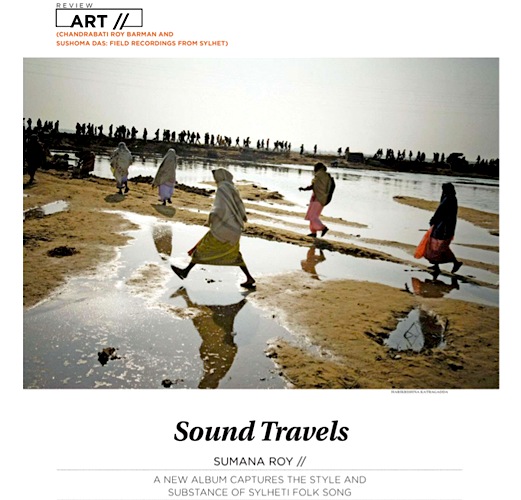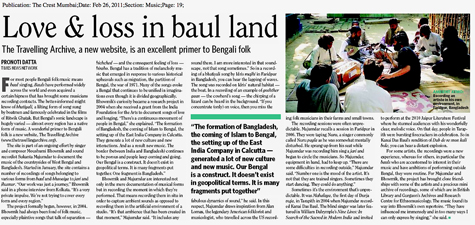
Response
Response is about how people have responded to our work of The Travelling Archive so far. But more than just stringing the comments in the Press and from friends, also people we do not personally know, this section opens up roads which can take us in endless directions. Those whose voices we have brought to this page all come from interesting worlds and we have tried to make links with those worlds in this space. So, from one link to another, from one interesting project to another, from an archive to a radio programme to a little school near a lake—a whole wide world can open up for us here, should we choose to embark on this rewarding journey.
Sharing with you a selection of responses we have had to the website and to our first CD from Travelling Archive Records, in the Press and from friends, also people we do not personally know.
__________________________
Review of the album, Chandrabati Roy Barman and Sushoma Das, Field Recordings from Sylhet by Sumana Roy
Caravan Magazine, April 2014
Click on the image to download a pdf
or read online
__________________________
Field Recording in Gurgaon. 9 February 2013
In February 2013, we had been invited to Unbox, a three-day festival of mainly visual designers, sound artists and city planners held in Delhi, to make a presentation and take a workshop on field recording.
For The Travelling Archive, one of our main areas of interest has been the theme of migration, memory and music. What songs and stories, what memories of sound we carry with us when we leave a home and go in search of a new home? What sonic impressions mark us when we visit a place? What new homes do we build with our memories of sound? And in the land left behind—what traces of the past can we hear in the sounds of the present?
These questions have led us in many directions. Sukanta worked with traces of sonic memory in a deserted factory in his National Instruments project; together the two of us worked on two films with silent footage; and of course there are the series of field recordings that we have been making in London since 2006, specifically on the theme of migration, memory and music, some of which can be heard in the British Library’s Sound and Audiovisual Archives. We saw this workshop in South City II of Gurgaon as a brief chapter in our continuing work on the theme.
Here we have a written response to the workshop from two of our ‘students’, Manan and Sarthak, and the video is from Gauri Sanghvi, the third member of the team.
The photos are taken by Manan and Gauri.
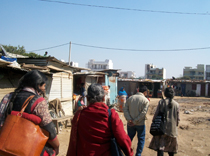
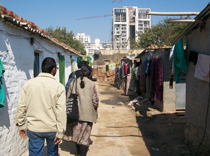
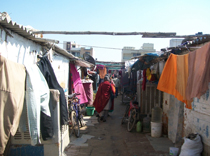
From the other side…
From Manan Sanghvi and Sarthak Parikh. Email sent on Sun, Mar 3, 2013 at 1:29 PM
This blog entry was taking forever, so Sarthak and I went to Banganga at midnight a few days ago to write it up. What we ended up doing however was talking about the Travelling Archives and recording it!
What we’ve finally managed to do is get it all down on paper, but we both feel that our recordings do much more justice to the amazing journey we’ve had with Sukanta and Moushumi.
We were attending the Unbox Festival in Delhi in the first week of February and Moushumi and Sukanta were conducting a Travelling Archives workshop at the festival. Although we’d been given a booklet giving details on the various workshops, we decided to head over to the Travelling Archives with absolutely no preconceptions. As we told them later, we’d joined them hoping to learn something completely different, and that’s exactly how it turned out to be!
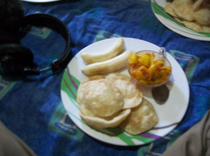
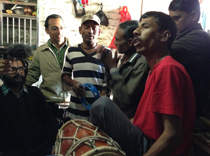
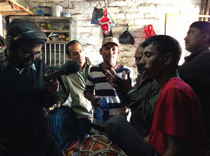
We were small group, Moushumi, Sukanta, Gauri, Sarthak and I. We met early Saturday morning and discussed what we’d be doing in the workshop. As we started to realize what we would be doing during the day, we started appreciating the sensitivity of the assignment we had enrolled ourselves in.
Music is a very personal journey for us all. Moushumi’s and Sukanta’s musical journey, independently and as the Travelling Archives is very powerful and moving. We felt it was so much more than just archiving the folk music of Bengal. It was an expedition into the lives of people, hearing their stories, listen to their songs and feel their joy, devotion, love and longing.
We traveled to Gurgaon to meet a community of Bengali migrants who worked as domestic help and cooks in the neighborhood. We had been invited to Prabhangshu’s house, who is a cook at, Moushumi’s friend Sudeshna’s home. Along with Sudeshna, we followed Prabhangshu to his community.
They introduced us as their students, but Sarthak and I had absolutely no experience with anthropological fieldwork. Although we had joined as observers, we became involved in the discussions, with Moushumi and Sukanta doing most of the translation.For us, it was a window into a culture so rich and varied.
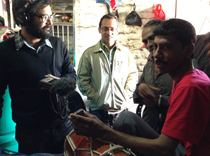
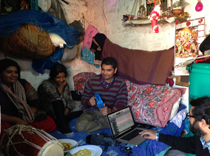
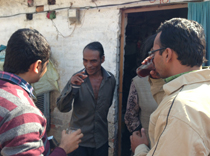
We met Sankar who sang songs of Radha and Krishna. We then met an old man, who had under very unfortunate circumstances migrated very recently to Gurgaon. He was a fisherman in the sunderbans, a Jatra performer and had once been a guide to botanists exploring sunderbans. He had also been jailed in Bangladesh for crossing over the maritime borders. He was so moved when he listened to Sukanta’s Jatra recordings that he started to sing and dance and cry. We could only wonder how strongly he was longing for the sunderbans and the forces that had drawn him here.
We had some great omelets, lucchi and batata bhaji prepared by Prabhangshu’s bhabhi while the discussions continued.
As we said our final goodbyes to the community and drove back to the festival, they told us how apprehensive they were in having others involved in their field work. Indeed even we realized how difficult it was to establish a bond of trust with strangers and request them to share their songs and stories with us.
I had been traveling for over a month now and when I was in Kolkata for work a few days later, Moushumi and Sukanta invited me over to dinner. I had been away from home for too long and I was travel weary and lonesome. With rum and coke by Sukanta and a meal cooked by Moushumi that reminded me of home, I felt an immense longing for home but their warmth made me feel right at home.
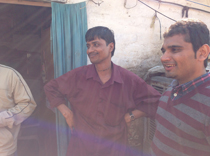
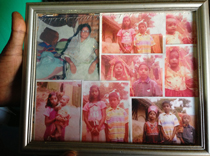
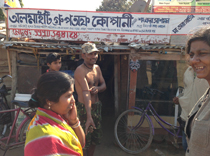
Maybe that is why the old man we met in Gurgaon started singing for us.
Maybe the only thing a travel weary soul yearns for is to be heard.
Maybe that is what makes the Travelling Archives so special for us.
For Sukanta & Moushumi
Manan & Sarthak.
__________________________
01/02/2011
Dr Janet Topp Fargion
Lead Curator, World and Traditional Music
The British Library
96 Euston Road
LONDON
NW1 2DB
www.bl.uk/wtm
T +44 (0) 20 7412 7427
F +44 (0) 20 7412 7441
janet.toppfargion@bl.uk
Editor for the International Association of Sound and Audiovisual Archives. Web: http://www.iasa-web.org
Hi Moushumi
Looks excellent. Well done!
I’ve referred it also to my colleague, Isobel Clouter, who is currently working through our Arnold Bake recordings.
Great to see such a good mixture of audio, video, photographs and written research. Nice and easy to navigate the site. Good quality recordings and great cross-referencing.
I’ve registered for the forum and created my first post – not sure if this makes mine the very first post.. . .
All the best
Janet
__________________________
Email from Soumya Chakravarti, Wed, Jan 12, 2011 at 8:20 AM
dekhlam. simply fatafati! anek kurnish! sabai ke janacchi.
Soumya Chakravarti is a physicist as well as a folk music collector and field recordist. He teaches in India and abroad. To know more about him visit http://www.lokgeet.org/
__________________________
Email from Ludwig Pesch, Sun, Jan 23, 2011 at 7:27 PM
. . . congrats – your website looks great and informative!
Suggestion: at a later stage, with more contents, a search function may also be useful.
Ludwig Pesch is German born, Amsterdam-based flautist, musicologist and authortrained in Carnatic and Western classical music. To know more, go to https://www.carnaticstudent.org/more-about-the-course-and-the-tutors/ludwig-pesch/
__________________________
Email from Fred Child to Moushumi, Tue, Apr 12, 2011 at 5:19 AM
. . . I just began looking through your website…my goodness, it’s a treasure! I’m enjoying the archival recordings. So many, and so diverse! I have lots to learn about Bengali music, but I love what I hear. . .
Fred Child is the host of the Western classical music programme, Performance Today, on American Public Media, commentator of the radio show Live @ Lincoln and co-host of the Carnegie Hall Live programme. He lives in Oregon. To know more about him visit https://www.yourclassical.org/programs/performance-today
__________________________
Email conversation with Axel Klein, Mon, Mar 14, 2011
Axel, 4:54 PM: Website looks good – hope that you will get sounds on there soon.
Moushumi, 5:19 PM: thanks, axel. but do you mean you weren’t able to listen to the tracks? there’s lots of sounds on it already.
A, 6:19 PM: Could not find the tracks, but will have another go.
M, 7:44 PM: go to recording sessions, select by year, pick a session, scroll down and you will find the play button. there is also some video. and sound embedded in some of the writings.
A, 8:02 PM: got it – but you should make it more prominent so that people can play the music easily.Very nicely done though, congratulations.
Axel Klein is a social anthropologist who teaches at the University of Kent, Canterbury.
For more on him go to https://research.kent.ac.uk/cbcd/person/dr-axel-klein/
__________________________
http://archive.prothom-alo.com/detail/news/290892
মৌসুমী ভৌমিক হাঁটছেন লোকগানের পথে
কুর্রাতুল-আইন-তাহ্মিনা | তারিখ: ২০-০৯-২০১২
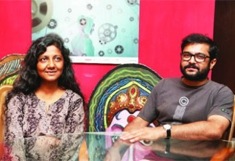
ছবি: আনন্দ
সহস্র যোজনের পথে
আমার ভয় হতেছে
একা যেতে।
গুরু তুমি আমার
সঙ্গে থেকে
সুপথ চিনাইয়া লইয়ো।
ওয়েবক্ষেত্রটির নীড়পাতা বা হোমপেইজে লেখা আছে বাণীকান্ত দাসের এই কটি চরণ। www.thetravellingarchive.org ঠিকানার এ ওয়েবক্ষেত্রে সঞ্চিত হচ্ছে গান-রচয়িতা ও গায়ক-গবেষক মৌসুমী ভৌমিক আর শব্দধারক সুকান্ত মজুমদারের এক পথ-খোঁজা আর পথ-চলার ফসল।
তাঁরা দুজন প্রায় এক দশক হলো বাংলার লোকগানের পথ হাঁটছেন। ভারতের পশ্চিমবঙ্গ ও সংলগ্ন আসামের কিছু অঞ্চল, বাংলাদেশ বা লন্ডনে সিলেটি অভিবাসীদের পাড়া ঘুরে তাঁরা রেকর্ড করছেন গান আর কথা। খুঁজছেন, ভাবছেন, লিখছেন।
‘নদী যেমন দেশের সীমানা বোঝে না, কেবল নাম পাল্টে পাল্টে চলে, কিছুটা তেমনই মানুষের গান আর গল্প, তারও এক নিজস্ব অবাধ স্রোত থাকে। তবে মানুষ কিন্তু ঠিক নদীর মতো নয়…মানুষের চলা ভিন্ন, সে “দুখভয়সংকটে” স্থানান্তরিত হয়, উৎপাটিত হয়, আবার স্বপ্নে সে নির্বাসন খোঁজে।…আবার এই মানুষ শব্দ বহনকারী, তার শরীরে আর স্মৃতিতে অজস্র স্বর আর সুরের দাগ। সে যখন চলে, তার সঙ্গে সঙ্গে তার গান আর গল্পও চলে।’—লিখেছেন মৌসুমী। কলকাতার বাউল ফকির উৎসব কমিটির বার্ষিক পত্রিকা আরশিনগর, বাউল ফকির তত্ত্বতালাশ-এ এ বছর ছাপা হওয়া তাঁর লেখাটির নাম ‘সময় আর শব্দের রেখায় ম্যাপ-নির্মাণ’।
ঢাকায় শ্রাবণের শেষ সপ্তাহে মহাখালীর ডিওএইচএসে রেলপথঘেঁষা একটি বাড়িতে মৌসুমী ও সুকান্তের সঙ্গে আড্ডা জমে উঠল।
মৌসুমীকে চিনি ঝিমলী নামে, সেই কবে থেকে। ঝিমলী বলেন, ‘এই বাংলাদেশের সঙ্গে তো আমার আসা-যাওয়ার সম্পর্কই। সারাক্ষণই তো আসছি, যাচ্ছি।’
২.
ওর বাংলাদেশে আসা-যাওয়ার সূচনায় ছিল আরেকটি গবেষণার কাজ, গত শতাব্দীর গোড়ার দিকের বাঙালি মুসলমান লেখিকাদের সম্পর্কে। ১৯৯৪ থেকে ১৯৯৭, ঝিমলী পুরান ঢাকার পাটুয়াটুলী থেকে লোকগানের ক্যাসেট কিনে নিয়ে যেতেন কলকাতায়—মমতাজ, আলেয়া, সালেহা, নারগিস আখতার…। আজকের গান-গবেষণার বীজ তখনই বোনা হতে থাকে—বলেন ঝিমলী।
অথবা শুরুটা সবকিছুর সঙ্গে মিলেমিশে ছিল আরও আগে থেকেই—‘আরও কিছু গান, অবচেতনে আমরা যেমন করে বয়ে বয়ে চলি; ঠিক জানি না কোথা থেকে এসেছে, যেমন সুর থাকে, কথা থাকে, ভাব থাকে গানের।’ কীর্তনের সুর বা বাউল গানের সুর—নিজের গানের ভেতরেও সেসব কী করে যেন চলে আসে।
একবিংশ শতাব্দীর গোড়ায় এসে মৌসুমী আজকের গবেষণাটির ধারণা গোছাতে শুরু করেন। ‘একটা সময় এল যখন মনে হলো, আমি নিজে তো গান লিখি বা সুর করি, গাই, সেটা এক রকম। কিন্তু এই যে গান, যে গান আমার নিজেরই গান, বা যে গান আমি শুনি, যে গান আমি শিখেছি, সে গানের আরেকটু পেছনে যাওয়ার একটা ইচ্ছে হলো।’
তখন তিনি থাকছিলেন লন্ডনে—‘আমি দেখলাম গানটাই আমার আঁকড়ে ধরার জিনিস হয়েছে। তাই আমি তার পেছনে যাত্রা শুরু করলাম একটা।’ ‘সময় আর শব্দের রেখায় ম্যাপ-নির্মাণ’-এ মৌসুমী লিখছেন, চলা-জীবনের বাইরে বেরোনোর একটা তাগিদও ছিল।
৩.
গবেষণার কাজ আনুষ্ঠানিকভাবে শুরু হয় ২০০৩ সালের শেষদিকে। শুরুর ভাবনাটা ছিল বিচ্ছেদের গান নিয়ে। ‘বিচ্ছেদের কিছু কিছু গলা ছিল, কিছু কিছু গান ছিল, যেগুলো আমাকে সাংঘাতিক টেনেছিল। প্রথম দিকে ভেবেছিলাম যে এসব মানুষকে খুঁজব। এই যে যারা ঘর আর বাইরের মধ্যে একটা টানাপোড়েনে পড়ে যায়, বিশেষ করে মেয়েরা।’
নিজের জীবনের সঙ্গেও কি এর মিল ছিল? ‘সেটা খুবই ছিল। আমারও মনে হচ্ছিল আমি ঘর আর বাইরের মধ্যে কোথাও একটা টানাপোড়েনের মধ্যে পড়ে যাচ্ছি। আমি লন্ডনে থাকছিলাম আমার পারিবারিক সূত্রে। তো সেখানে আমার খোঁজাটা, আমার অস্থিরতা, চলা-পথের বাইরে বেরোনোর তাগিদটা বাড়তে শুরু করে।’
বিচ্ছেদ থেকে ভাবনা পৌঁছায় বিরহতে। তারপর অভিবাসন, মানুষের চলাচল, গান নিয়ে চলা, দেশান্তরী হওয়া—ভাবনাচিন্তা আরও ডালপালা মেলল।
৪.
মৌসুমীর জন্ম জলপাইগুড়িতে আর বেড়ে ওঠা উত্তর-পূর্ব ভারতের মেঘালয়ের শিলংয়ে। বাবা ও মায়ের পূর্বপুরুষদের বাড়ি ছিল পাবনা আর বরিশালে। কিন্তু দেশভাগের আগেই তাঁদের পরিবার চাকরিসূত্রে ভারতে স্থিত হন। ফলে বাংলাদেশের সঙ্গে স্মৃতিতাড়িত কোনো যোগসূত্র মৌসুমীর ছিল না।
তবে নিজের গান গাইতে বহুবারই বাংলাদেশে এসেছেন মৌসুমী। আত্মার আত্মীয়তা গড়ে উঠেছে প্রয়াত চলচ্চিত্রকার তারেক মাসুদের সঙ্গে। তারপর মুক্তির কথার জন্য ‘যশোর রোড’ গানটা তৈরি করা, আরও পরে মাটির ময়নার সংগীত পরিচালনা। মৌসুমী বলেন, ‘তারেক মাসুদ আমার খুবই কাছের মানুষ, খুবই কাছের বন্ধু, আমার একদম গুরু বলা যায় অনেকভাবে।’ এ গবেষণার কাজেও তারেক অনেক পথ দেখিয়েছেন। বাংলাদেশে গবেষণাটির বড় দুটি ক্ষেত্র হচ্ছে বৃহত্তর ফরিদপুর আর সিলেট।
৫.
কথায় কথায় আর্কাইভের কথা আসে। মৌসুমী বলেন, ‘আর্কাইভ জিনিসটা নিয়েই কিছু তাত্ত্বিক প্রশ্ন আমাদের কাজ থেকে উঠে আসছে, আজকের দিনে একটা আর্কাইভে আমি (সংগ্রহগুলো) আটকে রাখব কি না, শুধু গবেষকদের জন্য, শুধু বিশেষ ইন্টারেস্টের মানুষদের জন্য। বিশেষ করে, যেটা একটা চলমান সংস্কৃতি, একটা মৌখিকতা যে সংস্কৃতির মধ্যে আছে, সে সংস্কৃতির আর্কাইভ করা কীভাবে হতে পারে? যে কারণে আমাদের এই ট্র্যাভেলিং আর্কাইভের ধারণাটা।’
ওঁদের ওয়েবক্ষেত্রের নাম দ্য ট্র্যাভেলিং আর্কাইভের বাংলা করলে দাঁড়ায় চলমান আর্কাইভ। ‘আসলে মানুষই তো চলমান আর্কাইভ একেকজন। যেসব মানুষের সঙ্গে আমাদের দেখা হয়, তাঁদের মধ্যেই তো পুরো জ্ঞানটা। এবং তাঁরা যতটা সম্ভব সেটা তাঁদের পরবর্তী প্রজন্মকে দিয়ে যান। কিন্তু সময়ের সঙ্গে সঙ্গে সেটা পাল্টেও যায়।’
ধারণ করা গানগুলো মৌসুমীরা ঘুরে ঘুরে মানুষজনকে শোনান, চিন্তাভাবনাগুলো বলেন, ছবি দেখান, গেয়ে শোনান। এভাবে আর্কাইভকে প্রাণ দেওয়ার চেষ্টা থাকে।
৬.
সুকান্ত মজুমদার এ কাজে যুক্ত হয়েছেন ২০০৪ সালে। তখন তিনি কলকাতার সত্যজিৎ রায় ফিল্ম অ্যান্ড টেলিভিশন ইনস্টিটিউটে শব্দধারণ বা সাউন্ড রেকর্ডিং নিয়ে পড়ছেন। ফিল্ড রেকর্ডিং বা সরেজমিনে শব্দধারণসহ অভিজ্ঞতাটা তাঁর জীবনের জন্য কেমন হলো?
‘আমার তো বদলে গেল জীবন একদমই! এই গান, এই ফিল্ড রেকর্ডিং করতে গিয়ে বাংলাদেশের সঙ্গে যোগাযোগ, অন্যান্য নানা যোগাযোগ ছাড়াও আরেকটা গুরুত্বপূর্ণ ব্যাপার ঘটেছে আমার ক্ষেত্রে। আমার কাজের দিক থেকেই একটা সম্পূর্ণ নতুন দিক আমি খুঁজে পেয়েছি, আস্তে আস্তে তা পাচ্ছি। ফিল্ড রেকর্ডিং, সেখানে একজন ফিল্ড রেকর্ডিস্টের উপস্থিতি, তাঁর সঙ্গে ফিল্ডের সম্পর্ক—এই জিনিসগুলো আমার কাছে এখন খুব গুরুত্বপূর্ণ এবং নানা প্রশ্ন নিয়ে হাজির হয়। আমরা আসলে রেকর্ডিং সৃজন করি, না রেকর্ড করি সেইটা খুব জরুরি একটা প্রশ্ন।’
সুকান্ত বলেন, ‘যখন এসে ঘাড়ে মাইক হাতে ক্যামেরা নিয়ে পৌঁছাই একটা জায়গায়, তখন আসলে সেই জায়গাটাকে আমরা এমনভাবে প্রভাবিত করি কথাবার্তা দিয়ে, উপস্থিতি দিয়ে—তখন গানগুলো বা যা-ই হচ্ছে, সেটা একভাবে তৈরি হচ্ছে। যদি আমরা না থাকি সেটা হয়তো আরেক চেহারা নেবে।’ সে জন্য তাঁরা একটা জায়গায় ফিরে ফিরে যান, মানুষের সঙ্গে পরিচিতি বাড়ে আর গানের চেহারাটাও তখন পরিষ্কার হয়। ‘আর গানকে আসলে সত্যি কথা বলতে গান হিসেবে ধরা যায় না। গানের সঙ্গে মানুষের এমন একটা যোগ!’
সুকান্ত আরও বলেন, ‘শুধু শব্দ একটা জায়গার বিষয়ে কতখানি বলতে পারে, এইটা আমার আরেকটা কেন্দ্রীয় কাজের জায়গা।’ পুরো কাজকে তাঁরা শব্দের রেখায় মানচিত্র-নির্মাণও বলছেন।
৭.
বিষয়টির পোশাকি নাম এথনোমিউজিকোলজি বা নৃকুল-সংগীতবিদ্যা। মৌসুমী ব্যাখ্যা করেন, ‘মানুষ যে গান তৈরি করছে, তা শুধু গানের কথা নয়, মানুষেরও কথা। মানুষের জীবনে গান—গান এবং মানুষের যে সম্পর্ক—গান দিয়ে মানুষের জীবনকে বোঝা। একটা প্রাণের প্রকাশ হিসেবে, গানকে জীবনযাপন হিসেবে আমরা দেখছি।’
এ গবেষণাকে দুবার সহায়তা করেছে ভারতের শিল্পকলা-পৃষ্ঠপোষক ইন্ডিয়া ফাউন্ডেশন ফর দ্য আর্টস। মৌসুমী আর সুকান্ত এখন চাইছেন ওয়েবক্ষেত্রটিকে ঢেলে সাজাতে। কিন্তু তার জন্য পৃষ্ঠপোষকতা এখনো মেলেনি।
ওয়েবক্ষত্রটিতে এখন পর্যন্ত কেবল গান ও আলোচনাগুলোর টুকরো অংশ বা ক্লিপ রাখা হয়েছে। বহু বিচিত্র ধারার অকৃত্রিম গলাগুলো শুনলে আরও শোনার তেষ্টা জাগে। ওঁরা বলছেন, পরবর্তী ধাপে মাঠে রেকর্ড করা শব্দ-ছবি সবটাই তুলে দেবেন। এসব শব্দ-ছবির সঙ্গে থাকছে মাঠের টোকা, এলাকা ও শিল্পীর পরিচিতি। এ ছাড়া, ট্র্যাভেলিং আর্কাইভ রেকর্ডস নামে রেকর্ড লেবেল বা প্রকাশনা বের করার পরিকল্পনা রয়েছে। সঞ্চিত এ সম্পদের সমান স্বত্ব গবেষকদের আর শিল্পীদের।
৮.
ঝিমলীর গান প্রথম শুনেছিলাম ১৯৯৩ সালে কলকাতার যাদবপুরে, তাঁদের পুরোনো একতলা বাড়ির সিঁড়ির সামনে বসে। তখন তাঁর পারিপার্শ্বিক ছিল পুরোপুরি শহুরে। এখনকার এই পথ-চলা থেকে ওর সবচেয়ে বড় পাওয়া কী হয়েছে? ‘কোথাও হয়তো জগৎটা একটু বড় হলো, বোঝাগুলো—বুঝতে পারাটা একটু বাড়ল। একটু নিজের গানের বাইরের জগৎটার দিকে তাকাতে শিখলাম। একতলা বাড়ির সিঁড়ির বাইরে একটু বেরোতে পেরেছি আর কি।’
একটু থেমে তিনি আরও বলেন, ‘পাওয়ার সঙ্গে সঙ্গে কিছু কিছু জিনিস চলেও যায়। যেমন সময় চলে যায়—একটা জায়গা ভরে, একটা জায়গা খালি হয়, এসবও হয়।’
__________________________
Email from Abhishek Jha, Sat, Mar 15, 2014 at 7:29 AM
I went through the selection of recordings available on soundcloud. In case time and your work has blurred your memory of me, I am the greedy engineering student who had to make the trip to NMML to satiate his hunger for life. We talked about Satish’s inspirational session during lunch and I asked you a small question about your reason for travelling to find the songs for The Travelling Archive when you mentioned John Cage.
As I had told you, Bangla is not my mother tongue. The regional dialect only makes it more difficult for me to arrive at the meaning of the text. But there is something about the rendition of those songs that makes me overcome my handicap and come back to the songs again and again. If it did not have this dynamic life in it, I would have been exhausted by now. It also reminded me how indispensable art is for an artist to live. It seems like a truism but it is not. Satish told us about Marathi writers living through penury because they cannot leave behind the stories that surround them. A person with a way with words can make money and live a life of comfort like millions of other people on this planet. But that would be an artificial existence, not life. Art does not yield to norms. It creates new norms. We hear a sense of urgency when Chandrabati says, ‘খুব বেশী ভালোবাসি গানকে’ while narrating how she did not let her married life impede her journey in music. It tells us why she was ready to bargain social acceptance and struggle-free life for a life with music. I am grateful to you for this.
Unfortunately, I am yet to arrive at the point where I can listen to the subtleties of sound in the songs. That might be because, being interested in literature, the narration and the text take all my attention. When I am finished with that part of the exploration, I might be able to direct my aural faculties to look for meaning in the sounds.
I found the answer to the question that I had asked you in the conference while reading your description of the journey that this archive is. In transmuting your personal journey into a universally felt feeling of separation and longing, you have presented a brilliant example of the artistic endeavour.
I am so grateful to you for making this available to us.
Abhishek Jha is a second year ungraduate student at the Indian Institute of Technology, Roorkie, Uttarakhand.
__________________________
http://www.thehindu.com/features/friday-review/music/the-archive-of-separation/article4418941.ece
The archive of separation
BUDHADITYA BHATTACHARYA
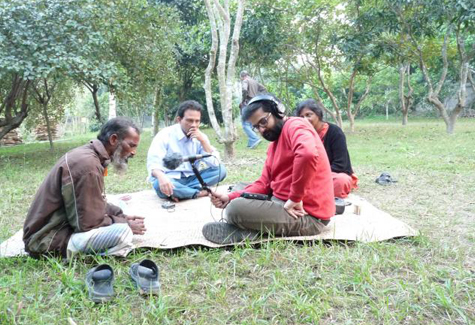
Sound and silence: Recording Habib in Faridpur, Bangladesh, earlier this year.
Moushumi Bhowmik and Sukanta Majumdar discuss the journey of The Travelling Archive.
For a production of his minimalist play Krapp’s Last Tape, featuring a 69-year-old man listening to a recording he made on his birthday 30 years ago, Samuel Beckett instructed his actor to “become as much as possible one body with the machine…The spool is his whole life”.
It is Krapp I think of while speaking to Moushumi Bhowmik, a singer-songwriter, and Sukanta Majumdar, an audiographer. The last ten years of their life have unspooled as a journey through Bengal, recording its “rich and varied” folk music, and disseminating it through The Travelling Archive (https://www.thetravellingarchive.org).
“In the beginning it was just a personal journey, a random collection of songs from the road, with no particular purpose or method in mind. I was picking up music with which I could instinctively connect, as a musician… Cassettes began to pile up on shelves at home in Kolkata, many of which remained wrapped in cellophane, gathering dust. But some I played over and over till their songs started to become part of my own repertoire. Then I wanted to know more than just the song,” Moushumi writes on the website.
The project started with a research and documentation grant from the India Foundation for the Arts in Bangalore in 2004. Moushumi was joined by Sukanta soon after, as a resource person initially and a co-researcher and traveller subsequently.
Over the years, the project has taken several turns. What started off as an interest in the form of song known as bichchhed gaan — songs traditionally about the separation of lovers, or metaphysical separation of the human from the divine — has grown into a search for songs with a more physical expression — as separation from home.
They have also evolved in the process. For instance, having studied in a film institute, Sukanta was trained to believe that the recorded sound should be “as clean as possible”. But recording on the field meant undoing some of this training and incorporating the ambience and atmosphere into the sound.
Their journey has also taken them beyond the marked boundaries of Bengal, from remote villages in Sylhet, Bangladesh, to London for a sub-project exploring the linkages between music, memory and migration. Recently, they visited Delhi to conduct a workshop at the UnBox festival.
They decided to conduct the workshop with three participants as a field recording with Prabhangshu, a Bengali migrant labourer from the Sunderbans, at his home in Gurgaon. Moushumi had known him from previous visits to the city, and he pulled out all stops to welcome them.
But is the reception everywhere equally warm? Doesn’t the sight of unknown travellers with sophisticated equipment ever inspire wariness or suspicion in the villages they travel to?
“It has never happened with us. As a methodology one thing we try to follow is not going into the unfamiliar. I have always worked in areas that are familiar, or somewhat familiar, and then the familiarity grows. We keep going back to the same places. There are some places we go every year to the same people and record the same songs,” Moushumi says.
Explaining their approach to the recordings, they say, “We don’t barge into someone’s house and start asking questions. We try to approach the field with a lot of humility. And slowly the conversations evolve. Slowly the song comes. Or not. We try to keep our presence as minimal as possible. The silence is as important as the song.”
It proves quite difficult to get an answer from them about their favourite recordings, but the announcement that they’ll be releasing an album of a recording done in Sylhet fills me with a gentle excitement. The album will be accompanied by the release of a bilingual book, comprising details about the artistes and field notes.
__________________________
Love and loss in baul land
The Travelling Archive, a new website, is an excellent primer to Bengali folk
PRONOTI DATTA
TIMES NEWS NETWORK
Click on the image to read the news.
__________________________
http://www.livemint.com/Leisure/9h6eQpw2jJZlgJZT5FavDN/Travelling-for-music.html
Travelling for music
Music Matters | Shubha Mudgal
Updated: Thu, Sep 15 2011. 09 36 PM IST
Singer-songwriter-composer Moushumi Bhowmik’s splendid online archive of music can be accessed atTravelling Archive , a remarkable virtual archive of the folk music of Bengal. The neat, minimal site design and simple interface reflects meticulous planning with an eye for detail, and provides access to music that has been painstakingly researched and collected by Bhowmik and recording engineer Sukanta Majumdar. This is work that could not have been achieved in a flash, so it isn’t surprising to find that Bhowmik and Majumdar have been collecting and recording from 2003, and are now set to share a collection of almost 180 hours of music and interviews recorded over 97 sessions.
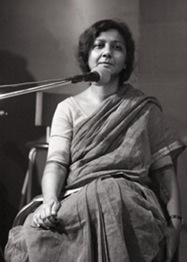
Sharing notes: Moushumi Bhowmik’s music archives are
accessible to all.
Photograph by Arif Hafiz
There are, of course, considerably larger and varied collections of music in the country, but what makes the Travelling Archive so unique is the generosity and openness of spirit with which the collection has been made accessible to the public, and its wonderful use of technology to achieve its objectives.
The smart search capabilities offered by the website permit visitors to browse the collections under three fields, namely: Artiste or Composer; Form, for example, Bangla qawwali, kirtan, etc.; Region, for example, Dhaka, Goalpara, Sylhet, Kolkata, etc.
Once a track has been selected for listening in audio format or viewing in video format, information about the track can be accessed easily. Other than providing track details (like duration, form, region), lyrics and notations can also be accessed, as can notes on the recording session during which the selected track was recorded. Location maps and photographs taken during the session add value to the details. This is in such strikingly pleasant contrast to the many important archives and music collections in the country that are often chained to decaying and lethargic state-controlled organizations, or to individual collectors whose sole purpose in life is to ensure that no one gets to hear even a squeak, leave alone a full track. Alas, there are many collectors in the country who have still not found the time or the inclination to catalogue their collections and make the catalogues available online. How then can they hope to attract visitors, students and researchers?
Also Read | Shubha Mudgal’s earlier articles
Bhowmik and Majumdar also provide a special section on their site dedicated to related research work. There is some fascinating material in this section, including film footage and audio recordings from Bengal made by the Dutch ethnomusicologist Arnold Bake (Music Matters, 18 September 2010, at (www.livemint.com/westmusic.htm) as far back as 1932 and 1933. A discussion forum provides an interactive space for members to discuss, argue and debate if need be. Although there is enough information and music on the site already for the dedicated visitor to spend many happy hours browsing, reading and listening, the Travelling Archive is an ongoing project, and will, therefore, constantly enrich itself and add to its resources. Meanwhile, the website offers so much that music teachers and students can put to good use, provided they have the will to discover the many delights it offers.
Write to Shubha at musicmatters@livemint.com
First Published: Thu, Sep 15 2011. 09 36 PM IST
Shubha Mudgal is one of India’s greatest singers of Hindustani classical and contemporary music. She is also one of the co-founders of Underscore Records.
__________________________
Email from Oliver Weeks to Moushumi Bhowmik, Fri, Jan 17, 2014 at 4:20 PM
. . . So.. the CD. The fieldwork material is of course fantastic and the stories behind these women are really interesting – the way the musical landscape has changed around them and how, for example, certain times of commercial / urban music have affected their music-making. The presentation / format that you’ve chosen seems quite innovative in itself – it’s quite an original thing you’ve done with this. Naturally with material like this you don’t want to dress it up – to try and make the expressive content too obvious to your audience by, for example, adding music or ambient background to it. But the experiment with, for example, using that Lomax extract is quite interesting. It’s an interpretative editorial interpolation, but I think appropriate. The CD isn’t just an archive – the music pinned on a board like butterflies – it’s an musical and intellectual experience, like a concert. Touches like this do help to add some framework to material that after all has been arranged by you in a way that the performers probably wouldn’t have thought of. You’re the curator here, after all.. Sorry I can’t write in more detail about the actual music – I’m in Romania at the moment and I don’t have the CD. If I did I’d listen to it again and write at greater length.. .
Oliver Weeks is a UK Based composer. For details go to http://oliverweeks.co.uk/
__________________________
Email from Shubha Chaudhuri to Moushumi Bhowmik, Sun, Oct 13, 2013 at 8:32 AM
booklet looks great Moushumi.. haven’t heard the CD yet.. but am including a track from it as part of our exhibit for World audio visual day!
Shubha Chaudhuri
Associate Director General ( Academic )
Archives and Research Centre for Ethnomusicology
American Institute of Indian Studies
22, Sector 32 HUDA Institutional Area
Gurgaon.
122001
INDIA
__________________________
Email from Richard Williams to Moushumi Bhowmik, Mon, Jan 13, 2014 at 4:58 PM
. . . Whenever I have a spare moment I listen to the CD, it’s really great. Conversations and beautiful music aside, I like the background noise in the tracks — so much more ‘organic’ and far less clinical than other works.
Richard Williams is a research scholar of music at King’s College, London, working on Hindustani performance cultures in colonial Bengal.
__________________________
Email from Angus Carlye to Moushumi Bhowmik, Fri, Oct 25, 2013 at 5:40 PM
Hi Moushumi,
We just wanted to take the chance to thank you for your amazing presentation last night. We think people were a bit blown away but the deft narrative that you wanted to tell, woven as it was with such incredible images and sounds. The Travelling Archive is a really amazing project and we certainly feel that this was communicated strongly last night. . .
Angus Carlyle is a sound artist and sound studies scholar who works at the London College of Communication, University of Arts, London
__________________________
Email from Anjum Hasan to Moushumi Bhowmik, Mon, Jan 20, 2014 at 10:00 PM
Hi Moushumi,
Hope your year is off to a great start. Thanks much for the CD. I’ve been listening to it over the last few weeks. Very interesting to hear these voices from so far away and exotic a place as Sylhet (even if it is near geographically, at least to Shillong!) Enjoyed the music, some of it seems very earthy and other tracks very sophisticated, like there is a mix of the simple and accomplished in the same voices. The documentation and sleeve notes are so thoughtfully done. It’s great to see the years of your research coming together.
My only suggestion for future CDs would be to bring in a little more of the cultural background of the region. I wondered about the cultural streams that had led these Hindu women in a now largely Muslim country to sing songs by Muslim composers and poets. And I couldn’t find an answer to that question in the notes.
Much love,
A
Anjum Hasan is a poet and novelist. She is currently book editor of the Caravan magazine.
__________________________
Email from Zac O’Yeah to Moushumi Bhowmik, Sat, Feb 1, 2014 at 4:20 PM
Hi Moushumi,
Anjum and I have listened to your record and it was a very nice experience, especially since the booklet worked as a guide to what one was listening to. Some of the characters sounded amazing. I hope you have captured it all on video and will make a documentary film of it some time in the future!. . .
Zac O’Yeah is a Swedish writer and critic who lives in India. For more details go to http://www.zacoyeah.com/
__________________________
Email from Labik Kamal to Moushumi Bhowmik, Tue, Aug 27, 2013 at 1:02 PM
Dear
I have just found out about your works and am really excited and overwhelmed with your efforts.
I got one of your CDs “field recordings from sylhet” and thus got introduced to your work. I am a folk musician myself and travel a lot trying to find authentic baul and related music.
I visited your website and found a list of artists and composers to choose from.
Where can I find a full list of your published work? I want to get the whole set.
Am based in Dhaka.
Will await your kind reply.
Labik Kamal Gourob is a Bangldeshi singer of folk and contemporary music.
__________________________
Email from Luva Ahmed to Moushumi Bhowmik, Sat, Aug 10, 2013 at 11:42 AM
Dear Moushumi, allow me to congratulate you on having completed a very commendable piece of research. The accompanying booklet is informative and an excellent read. I have received 8 CDs from Shanta. Both outlets of Aranya (Dhanmondi and Banani) reopen on 15th, so we can display the Cds then. . . .
Luva Nahid Choudhury
Director General
Bengal Foundation
Bengal Center
Plot 2 . Civil Aviation Area
New Airport Road . PO Khilkhet
Dhaka 1229 . Bangladesh
Off : [+880 2] 8901133 . 8901184
www.bengalfoundation.org
__________________________
Email from Anusheh Anadil to Moushumi Bhowmik, Mon, Sep 30, 2013 at 11:46 PM
Email from Anusheh Anadil to Moushumi Bhowmik, Mon, Sep 30, 2013 at 11:46 PM Moushumi di. . Etto shundor hoyeche. Kichui bolar nai. . I love the conversations. Buri duto eto mojar!! Amar friend derke ar CD deyni. . Oraito shob niye nebe. I kept 5 for the launch date. Ora pagol korey dichche. . Aro chae. Bondhuder debe. .
Ar tomar mishti proshno gulo gaan gulor theke kono orthe komna. .
Ami niye nebo Gautam’er theke. .
No chinta. .
Ador. .
Anusheh Anadil is a singer, composer, designer and entrepreneur based in Dhaka. For more on her see https://en.wikipedia.org/wiki/Anusheh_Anadil
__________________________
Email from Debjani Das to Moushumi Bhowmik, Fri, Aug 2, 2013 at 12:02 PM
MOUSHUMI,
tomar dui mashimar gaan shuney aar sheyi shurer thesta mitchey na.
Jigyesh korle heshe kisher jonye tomake thank korchi. Jantamna tokhon halka bagey khaamer khomota. Erokom record cdagey shunini, shonar ageyo, hathey mota boyier prishta ultiye koutohol, the pleasure and anticipation of reading.
Ours is an unmusical household, playere dhulo pore giyeche, mashi thakte deenraat robindrosongeet shunto, gaan shunte gele taar ghorey jetam. Anek deen porey abar gaan shunlam babar shathey, Duniya grew silent. Eta ekdom onyo rokomer gaan. Tader onek boyesh, na? Kikore shunlo? Chandrabati Roybarman’s voice is ageless aar shushomadaser prothom gaan struck me by its youthfulness. Duniya was visibly puzzled by the music: the unadorned voices, unfettered by instruments, we listened to the songs shimmering through the laughter and conversations. Ki adbhut mohila, tareek dekhlam, septemberey shesh gaan, and no hint of exhaustion, amar pashey baba, tader thekey shamanyo beshi boyesh. Perhaps with age, he has withdrawn into silence because he never learned to listen to music. I realised the gift of language, bangla, that in this life will remain more desirable and inaccessible to me than a foreign language. A sense of loss that language doesnt travel through genes.
Apurbo gola, kintu nesha jagay this tapestry of song, memories, confidences, laughter, in the midst of daily life.
—-
08/02/13
Tomader CD jodi academic hoy, then it nurtures the best academic traditions, with its intellectual generosity, honesty and rigour empowering both the singer and the listener.
Debjani Das teaches at the Steiner school in Wahlwies, Germany
__________________________
Text msg from Ambarish Dutta to Moushumi Bhowmik, 27.8.2013
Swatontro bibechonay Oshadharon kaj hoyeche. . .CB mashima r kache jante cheyechilam., uni ekhono shuneni. Aaj meyer bashay giye shunben. Tobe bishoyta tnake touch koreche boja gelo alap theke . . .
S.mashimar bashay giyeo paini. Chele bou janalo unio khubi ucchoshito. Hannan bhai janalen khub bhalo ekta documentation hoyeche. Bikrio hocche . . . Kabi Mostak shunechhe ebong taro bhalo legeche. Kobe pathacho. Amar 10ta. Boipotrer jonyo 10ta pattao apatoto. Agroho ache jotheshto. Mukhe mukhe prochar jotota para jay kora hocce . . .
Ambarish Dutta has been one of our main guides in our research in Sylhet. Professionally, he is a banker.
__________________________
Text message from Margot Cohen to Moushumi Bhowmik, 2/8/2013
Yes, the CD is just beautiful. Especially Track 13, if I remember correctly.
Margot Cohen is, freelance journalist from New York, worked in Indonesia and now based in Banglaore
__________________________
- Baul Fakir Utsav Journals
- Film, Art or Illustration?
- Essay
- Costis Drygianakis and Yiorgis Sakellariou, who have worked on Russian and Lithuanian folk music respectively, share their thoughts on the notion of traditional music
- Renee Lulam writes about oral traditions in the Khasi Hills
- Robert Millis writes about his listening memory of American folk music

